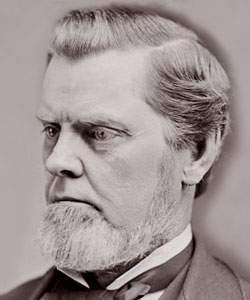Benjamin Harvey Hill (American National Biography)
Scholarship
Although a Whig, he aligned with the Constitutional Union party, a coalition led by Howell Cobb, Alexander Stephens, and Robert Toombs that hoped to sustain the Compromise of 1850 as the final settlement of the major differences between the North and South. Hill served on the party's executive committee until it disbanded in 1853. The Kansas-Nebraska debate prompted him to run for Congress in 1854, losing only by twenty-four votes. With the disintegration of the Whig party, he affiliated with the American or Know Nothing party and was the leading campaigner for Millard Fillmore in Georgia during the 1856 presidential race… [Hill] soon became a leading opponent of the Georgia Democrats and of secession. In 1857 he ran for governor on the Know Nothing ticket, losing by almost 10,000 votes to Joseph E. Brown. He was elected to the state senate in 1859, and in the 1860 presidential election he campaigned for John Bell of the Constitutional Union party. A few months later, he was elected to Georgia's secession convention, where he led the fight to keep the state in the Union. When it became apparent that secession was inevitable, however, he signed the ordinance of secession, while arguing for cooperation among the southern states. Despite his opposition, he was appointed to Georgia's ten-member delegation to the Provisional Congress in Montgomery, Alabama, to form the Confederate government and then was elected to the Confederate senate. Throughout the war he was one of the most consistent and vigorous defenders of President Jefferson Davis…
Michael Perman, "Hill, Benjamin Harvey," American National Biography Online, February 2000, http://www.anb.org/articles/04/04-00498.html.
Benjamin Harvey Hill (Congressional Biographical Dictionary)
Reference
HILL, Benjamin Harvey, (cousin of Hugh Lawson White Hill), a Representative and a Senator from Georgia; born in Hillsborough, Jasper County, Ga., September 14, 1823; pursued classical studies and graduated from the University of Georgia at Athens in 1844; studied law; admitted to the bar in 1844 and commenced practice in Lagrange, Troup County, Ga.; member, State house of representatives 1851; member, State senate 1859-1860; actively opposed disunion until the secession ordinance had been adopted; delegate to the Confederate Provisional Congress in 1861; senator in the Confederate Congress 1861-1865; arrested at the close of the Civil War and eventually paroled; resumed the practice of law; elected as a Democrat to the Forty-fourth Congress to fill the vacancy caused by the death of Representative-elect Garnett McMillan; reelected to the Forty-fifth Congress and served from May 5, 1875, until his resignation, effective March 3, 1877; elected as a Democrat to the United States Senate and served from March 4, 1877, until his death in Atlanta, Ga., August 16, 1882; chairman, Committee to Audit and Control the Contingent Expense (Forty-sixth Congress); interment in Oakland Cemetery.
“Hill, Benjamin Harvey,” Biographical Directory of the United States Congress, 1774 to Present, http://bioguide.congress.gov/scripts/biodisplay.pl?index=H000587.



